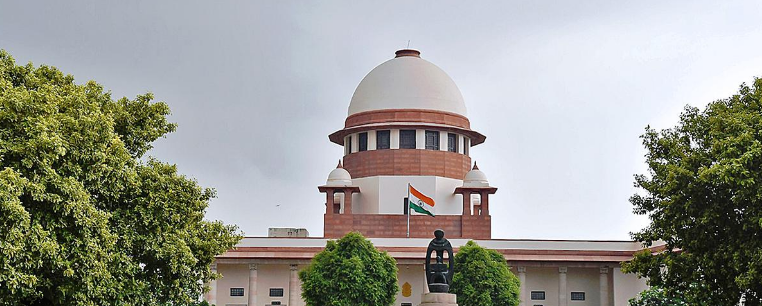
Political leaders do not have a higher level of immunity than regular citizens, according to a
bench that included the Chief Justice of India, DY Chandrachud, and Justices PS Narasimha and
JB Pardiwala.
CBI, ED
The Bharatiya Janata Party-led central government is accused of abusing central agencies like the Central Bureau of Investigation (CBI) and the Enforcement Directorate (ED) against opposition party leaders, according to a petition filed by fourteen political parties to the Supreme Court on Wednesday. [Indian National Congress vs Union of India] Political leaders do not have a higher level of immunity than regular citizens, according to a bench that included Chief Justice of India DY Chandrachud and Justice JB Pardiwala.
So, after collecting millions of dollars from regular pensioners without making a payment, several FIRs are filed, and the case is brought here. Can we say that no arrests are possible in this situation? How can we say there can be no arrests unless a three pronged test is satisfied once we accept that political leaders are absolutely on equal footing with common citizens and have no higher immunity?” the bench questioned.
The petitioners were attempting to extrapolate statistics to get the Court to set rules, the Court further stated.
“You are attempting to convert the statistics into dependable legal principles. Therefore, these statistics are currently only relevant to politicians, said CJI Chandrachud.
The bench added that anyone who feels personally wronged can seek redress from the Court by using legal avenues, but that there cannot be any overarching principles without taking into account the particulars of each case.
How can we establish rules in an arbitrary situation. It is impossible to establish general rules without knowing the specifics of the case. The law can be established as the highest court in the nation if someone comes to us; it is based on the specific facts of the case as well as general law. (But) we need to have facts in a case or group of cases,” the Court said. We’re sorry, but we can’t consider this, the bench added.
The petitioners then asked the Court for permission to withdraw their plea, which was granted. The petition was filed by Indian National Congress (INC), Dravida Munnetra Kazhagam (DMK), Rashtriya Janata Dal (RJD), Bharat Rasthra Samithi (BRS), All Indian Trinamool Congress (TMC), Aam Aadmi Party (AAP), Nationalist Congress Party (NCP), Shiv Sena (UBT), JMM, JD(U), Communist Party of India (Marxist), CPI, Samajwadi Party, J&K National Conference.
The petitioners claimed that the use of coercive criminal proceedings against opposition political
figures and other citizens who exercised their fundamental right to dissent and disagree with the
union government had increased alarmingly.
It was argued that investigative agencies like the CBI and ED are increasingly being used in a selective and targeted manner in an effort to completely crush political dissent and overturn the tenets of a representative democracy.
To support their claims, the petitioner also provided the following statistics.
- The action rate on raids in terms of complaints filed following raids reduced from 93 per cent
in 2005-2014, to 29 per cent in 2014-2022; - Despite an increase in the number of cases registered by the ED from 209 in 2013–2014 to 981
in 2020–21 and 1180 in 2021–22, only 23 convictions have been obtained to date under the
Prevention of Money Laundering Act (PMLA); - Between 2004 and 2014, the CBI looked into 72 political figures; of those, 43 (less than 60%)
came from the opposition. Now, this figure is over 95 percent.
The proportion of opposition leaders among all politicians under investigation by the ED
increased from 54 percent before 2014 to 95 percent after 2014.
In order to fulfill and realize the guarantee of personal liberty under Article 21 of the Constitution for all citizens, including those targeted for exercising their right to political dissent and for carrying out their obligations as the political opposition, the petitioners sought guidelines. - For arrest and remand
The petitioners requested that all arrests involving any cognisable offenses, with the exception of
those involving serious bodily harm, be made using the triple test by police officers, ED officials,
and courts.
If these requirements are not met, alternatives such as house arrest or, at most, scheduled
interrogations can be used to satisfy the requirements of the investigation. - For bail
The petitioner requested that all courts adhere to the dictum “bail as rule, jail as exception,”
particularly in situations involving non-violent crimes.
They prayed that only in cases where the triple-test was not met should bail be denied.
The petitioners asked for instructions to align special laws like the PMLA, which have strict bail
requirements, with Article 21 of the Constitution.
Unless the conditions under the triple-test are not met, the accused may be released on bail even
under special laws when it appears that the trial will not be finished within six months.
Senior Advocate AM Singhvi, speaking on behalf of the petitioners during today’s hearing,
asserted that the CBI had clearly been used erratically in areas where opposition-ruled States
were in power, which had resulted in an unfair playing field for democracy.
Therefore, he claimed, “opposition is only fighting these cases… democracy has been held to be a
fundamental element of the constitution.”
Furthermore, it was argued that the petitioner-parties represent 42% of the electorate, so if they
are impacted, so are the people.
“Level playing fields must be maintained because these are parties from all different ideologies.”
The senior counsel asked,
What is democracy if the authorities are only pursuing these cases?
He also emphasized that in nearly 95% of cases, the triple test could not be satisfied, making the
process itself the punishment. He consequently argued that concentrating on individual cases
was not the solution when there is a conscious weaponization of a whole branch of law.
The Court, however, decided not to accept the plea.
Shadan Farasat, an attorney, drafted and filed the petition on behalf of the India National
Congress, and Senior Advocate Dr. Abhishek Manu Singhvi adjudicated it. - Written By- Tushar Vashisth students of 3rd year BBA LLB at Chandigarh University





0 Comments